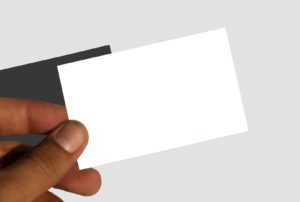
Blank may be better…
I know there’s some kind of marketing value in having lots of “letters” behind your name and on your business card.
But please, let’s stop the madness.
Paying $59.99 to be a “Certified Life Coach” does not actually add anything to your practice. Becoming a “Certified XYZ Therapist” for a few hours of training that doesn’t help you do anger therapy any better than basic counseling training is a bit shameful. Mediation and anger and wellness, oh my! I’m sort of willing to go the distance on this and say that these kinds of credentials are actually unethical and misleading (APA Ethics Code 5.01 & ACA Ethics Code C.4)
Not convinced? Read this article about how a middle schooler can become a “Certified Clinical Trauma Professional” and then come back. Here’s the tl;dr…
Mental health professionals typically represent their competencies by earning a diploma and obtaining a state license to practice. Some practitioners choose to further represent their expertise by acquiring specialty certifications. We review the broader landscape of these certifications and provide a case study of a program that illustrates current problems with specialty certifications. Specifically, we demonstrate that an 8th grader with no prior mental health education or training can pass a test intended to assess expert levels of knowledge obtained from a workshop. Implications of these findings on the validity of specialty credentials and the public’s trust in them are considered.
Rosen, G. M., Washburn, J. J., & Lilienfeld, S. O. (2020). Specialty certifications for mental health practitioners: A cautionary case study. Professional Psychology: Research and Practice. Advance online publication. https://doi.org/10.1037/pro0000324
Let’s not chase the appearance of expertise. We don’t need to compete with 8th graders. Own your real credentials; clients will respond to your actual expertise.